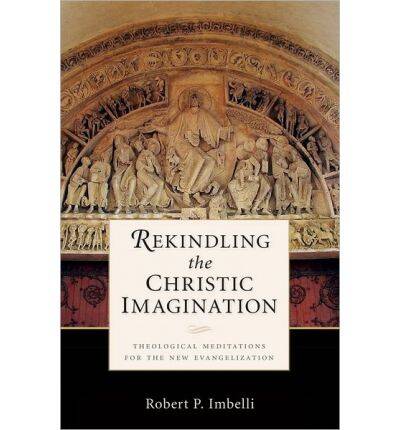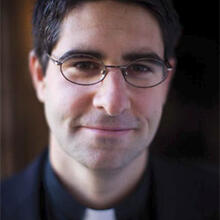In the 1980s, the American short story writer Raymond Carver penned a story called “A Small, Good Thing.” It is a haunting story that includes, at once, the death of a child and an ending that illustrates the hope of companionship: the breaking of bread together. The bread served to the grieving parents becomes an instrument of reconciliation, nourishment, conversation and healing. The bread is “a small, good thing.”
The Catholic Book Club’s June selection, Rekindling the Christic Imagination: Theological Meditations for the New Evangelization, by Fr. Robert Imbelli, might also be called a small, good thing. It is a brief, accessible book that sits perfectly in one’s hands. Its pages are heavy and glossy, its margins wide, its print clear, its headings helpful, its notes and bibliography thoughtful and informative and its artwork striking. The book is a small, beautiful thing that consists in four mediations about Jesus Christ, Trinity, Eucharist and Church. At the heart of the book is a reassurance of the transformative presence of Jesus Christ in the world, in the church and in that which reconciles humanity with its Creator: Jesus Christ present in the bread and wine of the Eucharist.
Though only 100 pages long, the book is comprehensive: it refers to Dante, Flannery O’Connor, Walker Percy, Simone Weil, Charles Taylor, Etty Hillesum, Andre Dubus, as well as Irenaeus, Augustine, Aquinas, Newman, Teilhard, de Lubac, Rahner, von Balthasar, Benedict XVI and Pope Francis. Imbelli also draws generously from Scripture, especially in his comprehensive presentation of Christ from his anticipation in the Servant Song of Second Isaiah through the incarnation, life, death, resurrection and ascension as portrayed and preached in the Gospels, the Pauline epistles and the apostolic letters. For, as Imbelli writes:
The eyes of Christian faith perceive this fullness in Jesus Christ. He is Torah, Temple, and Sabbath in person. His crucifixion is the burning bush of God’s holiness and his resurrection the “I am” of God’s ever presence. The new covenant has been established in his crucified and risen body and will not pass away because, by his Ascension, Jesus’ humanity has been assumed into God (30).
Imbelli recalls for his readers Jesus’ saving ministry and its efficacy:
[Christ’s] cross is the consummation of his passion for communion to the point of taking on himself the sins of the world. His resurrection is the beginning of the new creation…. Resurrection, then, is the end, the goal of incarnation: humanity fully transformed and glorified in God. Whether in the first century or the twenty-first, this Good News is the heart of evangelization (15).
And so, as a consequence, we who live in the present secular age must appropriate the Christic narrative of Scripture in order to, as Imbelli writes:
[…] attract hearts and minds searching for meaning and purpose in their lives and relationships. The beauty, goodness, and truth of Jesus must lay hold of us as we strive to fathom the extent of the transformation to which he summons us. Jesus’ passion for communion and his Eucharistic imagination must fire our passion and enkindle our imagination, not only in the enthusiasm of conversion, but throughout the transfigurative journey of discipleship (16).
Reassurance—perhaps, re-animation and re-creation—in Christ leads to a commitment to ressourcement (the recollection and contemplation of the wisdom of the early centuries of the church) as well as the crucial mission to re-appropriate the riches of the Christian faith to the present realities of the world. Such reappropriation reflects Jesus’ passion for communion and rekindles the modern Christian’s hope for unity and holiness within the Body of Christ, the church.
For Imbelli, the church is the place of unity and holiness (76). The church, anchored in the revelation of Christ, seeks its own transformation or “Christification” and extends its desire for authentic Christification to the whole world (83). The scope of the church encompasses the communion of saints and the Eucharistic table. The church is the place of liturgy that recalls the triune nature of the Christian God and enkindles among its members Jesus’ own passion for communion. Such a rekindling of the Christic imagination serves to combat modern despair stemming from fear of death and isolation. A comprehensive, contemplative grasp of the incarnation precludes the modern tendency toward excarnation—a Gnostic distortion of human life and desire. Christ overcomes isolation and fear. For, Imbelli writes:
The incarnation of Jesus realizes its continuing presence in the sacrament of the Eucharist, and patiently works its ultimate purpose: to fill up the body of Christ – the body of redeemed humanity. These are dimensions of the one enfolding and unfolding mystery: the Love in which we live and move and have our being (92).
Thus, Scripture, Eucharist and Church underscore a Christic center through which humanity is invited to genuine communion with one another and with God. Christian art and literature reflect this Christic center and the transformation it inspires and nurtures.
I urge members of the Catholic Book Club to spend some time with Fr. Imbelli’s book. Do not simply read it, but pray with it. May it reassure you in your faith and enkindle in you a Christic and Eucharistic imagination. I assure you that Fr. Imbelli’s book is a small, good thing.
Also, take a look an interview that Boston College Libraries conducted with Fr. Imbelli. It serves as a fine introduction to the book and the man who wrote it.
Finally, please consider these questions and contribute to our discussion of the book:
1. In your contemplation of Jesus Christ, have you ever considered Jesus’ imagination? What might the Christ of the Gospels imagine? What does the risen Christ imagine for you?
2. Is there a work of art—painting, sculpture, novel—that inspires in you a deeper recognition of God’s presence in creation? What is it? How might this work of art inspire a meditation such as the ones presented by Fr. Imbelli?
3. Do you have any questions for Fr. Imbelli?









I’m with Beth when she suggests that words, words, words are no substitute for a personal encounter with the Word Incarnate (6/16 and 6/21) but sometimes they can take you on an interesting tour while you’re waiting. I found this book to be an interesting mystical tour in which Fr. Imbelli attempts to bring old traditions back to their source in the Risen Christ. If the route is circuitous it’s probably because there is no direct path into the center of the mystery. He believes that effective evangelization in our secular world begins with the overwhelming felt presence of Christ in our midst. And I think that is exactly what’s missing in so many efforts to reach the unconverted. No one will come to Christ if they feel Christ is not paying attention to them.
In Rekindling the Christic Imagination, Fr. Imbelli, speaks to evangelizers about the subject of evangelization (the Risen Christ) but, like so many who would bring Christ to the world, he tends to skip over the significant third member in the equation. Perhaps this is only because they need and deserve separate consideration but I don’t see how the project of evangelization will ever be effective if those to be evangelized are not given serious attention also. Father Imbelli does go as far as identifying the unconverted as “excarnated” but offers little more after sketching in the meaning of this condition. At the end he himself hints at the book’s deficiency when he quotes Irenaeus: “in reality every authentic act of evangelization is always new”.
In reality, every act of evangelization must be new because no two persons will ever experience the absence of Christ in exactly the same way—or his presence either for that matter. That the Church sincerely wants to make Christ present for all souls is beyond question. Sometimes this can happen only when the words stop and the cries coming out of the void are heard.
I have wondered at times about Jesus’ thinking processes and how he imagines the workings of redemption. But until now, it has never occurred to me to ask what the Risen Christ might imagine for me. The question was always “what is God’s plan for you?” And that is a question I rejected out of hand long ago because it implied a sweeping executive action on God’s part that I just couldn’t square with free will. That rejection, of course, left me with only “the hint half guessed, the gift half understood.” And that has not been a bad thing (in hindsight).
To reframe the question as ” what does Christ imagine for you?” feels a lot less claustrophobic. It makes room for a creative dynamic in which God and I continually imagine and re-imagine in response to one another as grace and decision bear fruit—or not. It even starts to sound like fun: what can we dream up for tomorrow? So part of the answer to “what does the risen Christ imagine for you?” is that he imagines me imagining what he imagines for me. How cool is that?